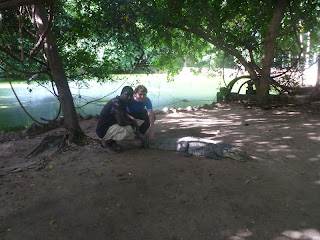Everyone is getting ready for the celebration of Tobaski,
the Festival of Sacrifice (otherwise known as Eid al-Adha). It promises to be a big
celebration, with all Gambians (both Muslim and non-Muslim) going back to their
family homes to celebrate. Tobaski is due to fall on the 6th of November
, so everyone is in preparation mode, buying new clothes and amassing lots of
tasty food (most families will try to buy a live ram to slaughter and eat on
the day). It’s an expensive affair, and so can be a real struggle for people. This is particularly true for the head of the family, who may lose face if he doesn’t have
enough money to provide the necessary goods. Thus, promotional offers like the
one in the photo above are very popular. I’ve never seen live animals offered as
prizes by mobile phone companies before!
Diwali in The Gambia –
Last Wednesday was Diwali. As one of my fellow volunteers, Soumita, is from
India it was the perfect excuse to do a party! Soumita decorated her house with lots of candles,
doing her best to do justice to the Festival of Light. We had some nice food
and I was treated to a bit more of an explanation as to what Diwali is all about (in
particular, the fascinating story of Rama and Sita). I guess this evening illustrates
an interesting side to life out here. Many of the foreigners here do their best
to support each other, knowing that most are in the same boat of being a stranger
in a foreign land, someone who is far away from home. It also shows the randomness of
how things can be – a British person celebrating a Hindu festival in Africa! Anyway,
it was a lovely evening and I was honoured to be part of it.
Off to the countryside – yes, finally I’m escaping the city
and will be going off to rural Gambia for a few days. Horaay! I’ve been asked
to do some work on creating a promotional film for a rural disability
organisation, based in Basse (to the very east of the country). I’ll be
covering the support the organisation offers and the lives of some of the
disabled people there, should be fascinating. Anyway, I depart on Sunday and a six hour car
drive awaits. I’m really looking forward to seeing more of the countryside and
experiencing a bit of rural life. Expect some photos next week...
Lots of love and a big hug from an excited volunteer! I hope all is well with you, take care,
Robert





















